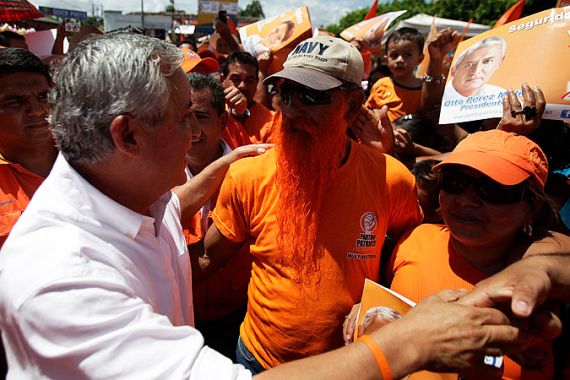Guatemalan vote heads towards runoff
Former general ahead in early counting, but presidency race in Central American nation looks set to go to second round.

Ballot counting is under way following Guatemala’s presidential election with Otto Perez Molina, a retired general from the right-wing Patriot Party, holding an early lead, according to preliminary results.
But with candidates needing more than 50 per cent of ballots to avoid a runoff, the election looked certain to be heading for a second round later in the year.
Otto Pérez Molina, 60, who promises to send troops to the streets to fight criminal gangs, had received 37 per cent support with more than 60 per cent of ballots counted by 9.34GMT.
This was still well shy of the 50 per cent needed for an outright first-round victory.
His share of the vote was less than earlier polls had predicted, but he still had a lead of 15 percentage points over his nearest rival, Manuel Baldizon, 41.
The two men now seem certain to face each other in a November 6 runoff election, as previous polls also indicated. Neither of the candidates was likely to claim over half the votes, according to these opinion polls.
If that is confirmed after the ballot counting, the top two finishers will face off in a runoff election on November 6. The new president will take office in January.
According to the polls, the favourite to succeed Colom is Perez, followed by populist businessman Baldizon.
Perez had more than a third of the five per cent of votes counted by 4.57GMT, followed by Manuel Baldizon with 24 per cent and Eduardo Suger with 15 per cent, the electoral commission said late on Sunday.
Both of Perez’s main rivals are businessmen. Seven other candidates, also vying to succeed outgoing Alvaro Colom, the outgoing president, shared the remaining votes.
In pre-election opinion polls, retired general Perez, known for his symbol of an “iron first”, had the support of as many as 48 per cent of voters, Baldizon 18 per cent and Suger 10 per cent.
“Let’s not exclude the possibility that we could win in the first round,” Perez said after casting his vote in a local school Sunday. “It will be the will of God and the Guatemalan people, but let’s not rule it out.”
Perez would be the first former military leader elected president in Guatemala after the end of the military dictatorships of the 1970s and ’80s. Voters also elected legislators and hundreds of mayors.
Peaceful voting
Voting ended at 0000 GMT, in an election that was widely regarded as quiet despite some instances of violence and fraud allegations.
Guatemala’s electoral authorities and Jose Octavio Bordon, head of the observer mission deployed by the Organization of American States, agreed that voting had taken place normally.
A local group with over 3,500 observers reported 65 incidents to electoral authorities.
The campaign in the Central American country has been marked by crime, with 24 politically motivated murders since January. More than 22,000 police officers were deployed to provide the security for Guatemala’s over 7 million voters.
Crime, violence and the economy have been the biggest campaign issues for voters in the Central American nation of 14.7 million people.
“We are afraid all the time of the criminals,” Mario Rojas, a resident Guatemala City, the capital, told Al Jazeera. “We are afraid of ourselves or our children being murdered.”
Lucia Newman, Al Jazeera’s correspondent in Guatemala City, said “violence provoked by gangs, organised crime and drug traffickers has made the country one of the most dangerous in the Western Hemisphere”.
Drug cartels, most commonly from Mexico, are using Guatemala as a shipping route, resulting in regular fighting and other violence between rival gangs.
Analysts claim the murder rate of 45 per 100,000 people shows that violence is as bad or worse today than it was during Guatemala’s 36-year civil war which killed an estimated 200,000 people.
A UN-sponsored truth commission found that 93 per cent of those killings were carried out by state forces and paramilitary groups during a war in which leftist rebels fought various military dictatorships and the economic elite.
Challenges ahead
Perez Molina, 60, was a military general during the fighting, but he also played a role in negotiating the 1996 peace accords that ended the conflict.
“What we have to do is to re-gain control of our national territory and our institutions and confront these criminal organisations that generate more than 45 per cent of violence. Security and justice are my priorities,” Perez Molina told Al Jazeera in an interview.
Molina lead his nearest rival, Baldizon, by about 20 per cent in pre-election polls. Baldizon has promised to carry out more executions, possibly in public, and said Guatemala’s national football team would make the World Cup if he was elected.
The three leading candidates are all conservatives. The only candidate on the ballot considered a leftist is Rigoberta Menchu, an indigenous activist and Nobel Peace Prize laureate who looks set to win about two per cent of the vote.
About half of all Guatemalans live in poverty, and the indigenous and rural poor are disproportionately affected by current trends of violence.
Alvaro Colom, the current president, is not vying for another term. His wife, Sandra Torres, divorced Colom in an attempt to circumvent a law banning close relatives from running for the presidency, but a court ruled that she was still ineligible.
The next president will face massive challenges in a country unable to create well-paying legal jobs for its young population, Al Jazeera’ Newman said.
Newman added that unless the new leader could reduce crime, inequality and other social problems then “central America’s most populous country could inch even closer to what some are calling a failed state”.